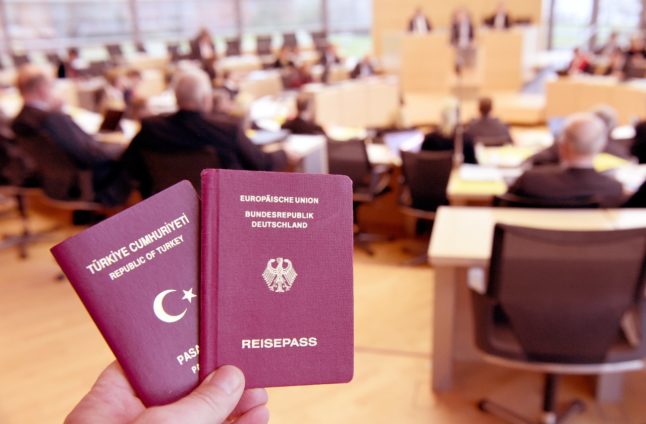The signature marks the end of a long and gruelling parliamentary process in which the citizenship bill was repeatedly delayed, at first by coalition in-fighting and then by hold-ups in official processes.
After the reform was approved by the Bundestag in January and the Bundesrat on February 2nd, Federal President Frank Walter-Steinmeier took seven weeks to finally give the bill his seal of approval.
The process normally takes two weeks.
A recent version of the bill published on the Federal Law Gazette contains the signature of Steinmeier, as well as Chancellor Olaf Scholz, Interior Minister Nancy Faeser, Foreign Secretary Annalena Baerbock, Justice Secretary Marcus Buschmann and Family Minister Lisa Paus.
The signatures are dated March 22nd and the bill was allegedly passed to Bonn to be entered into the official register of bills on March 26th.
READ ALSO: KEY POINTS – What you need to know about Germany’s citizenship law reform
With this last formality out of the way, the bill is set to come into force within three months of the signature on June 26th, 2024.
According to the Interior Ministry, the sweeping reform will clear multiple hurdles for foreigners who want to naturalise as German citizens.
This includes reducing the numbers of years foreigners must be resident in the country before they can naturalise as Germans. Instead of the current eight years, or six in exceptional circumstances, this requirement will be cut to five years, or three in cases of special integration.
Another key change is the permitting of dual – or multiple – nationality on a universal basis. This will mean that non-EU citizens will be able to naturalise without needing to give up their current citizenship.
READ ALSO: Who qualifies for ‘special integration’ status under Germany’s citizenship law?
Currently, around 11 million migrants live in Germany without German citizenship or the right to vote in federal or state elections.
Commenting on the reform, Interior Minister Nancy Faeser said: “Many immigrants feel German, but do not want to completely cut ties with their country of origin.
“In future, they will no longer be forced to give up part of their identity. We are making the long overdue paradigm shift and allowing multiple nationality.”
In passing the bill, Faeser also acknowledged that the government had achieved one of its major goals as part of the current traffic-light coalition along with the Greens and Free Democrats (FDP).
In previous coalitions with the right-wing CDU and CSU parties, dual nationality had been a project that the SPD had never succeeded in implementing.



 Please whitelist us to continue reading.
Please whitelist us to continue reading.
Member comments